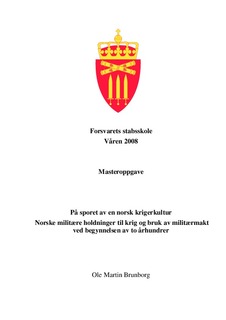På sporet av norsk krigerkultur: norske militære holdninger til krig og bruk av militærmakt ved begynnelsen av to århundrer.
Master thesis
Permanent lenke
http://hdl.handle.net/11250/99846Utgivelsesdato
2008Metadata
Vis full innførselSamlinger
- Masteroppgaver [450]
Sammendrag
In this thesis I have studied military culture and military thoughts on war and warfare within the Norwegian Army in the period 1900 – 2007. The thesis is built up around two in-depth case studies, concentrated on the periods 1900 – 1914 and 1990 - 2007. The thesis examines military culture by comparing the military culture at the national level and at the warrior subculture level in the Army. Around 1900, the Norwegian society as well as the military culture at the national level was heavily influenced by the common political and ideological currents in Europe. The political ideal of the time was the national state. The most widespread ideology was nationalism with traces of Social Darwinism, bellicism, war theology, the cult of the offensive and militarism. Norway was no exception. The content of the warrior subculture at the professional level in the Army derived from the values at the national level and reflected “the hard values of the battlefield”. Around 2000 the values of Norwegian society and military culture at the national level have changed dramatically. In roughly 100 years the overall cultural and ideological arguments for waging war have ceased to be based on nationalism and nationalistic motives and come to be legitimized by references to universal Human Rights. The fatherland has given way to humanity as the highest value within Norwegian society as well as within the army. Although the military culture at the national level has been rocked by tremendous social changes, the Norwegian Army´s warrior subculture remains relativly unchanged. The content of the warrior subculture is no longer derived from the values at the national level. The warrior subculture does not reflect the values to be deduced from universal human rights, individualism and humane warfare but continues to reflect the virtues required for success on the battlefield. The present warrior subculture is a result of the functional imperative fully in line with the ancient warrior cultures. The warrior subculture has prevailed because it is still essential to success on the battlefield.
